| Sample Type |
Collection Container |
Special Precautions/Information |
| Air-dried slides |
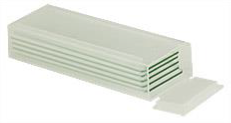 Slide box Slide box |
N/A |
| Serous Fluid |
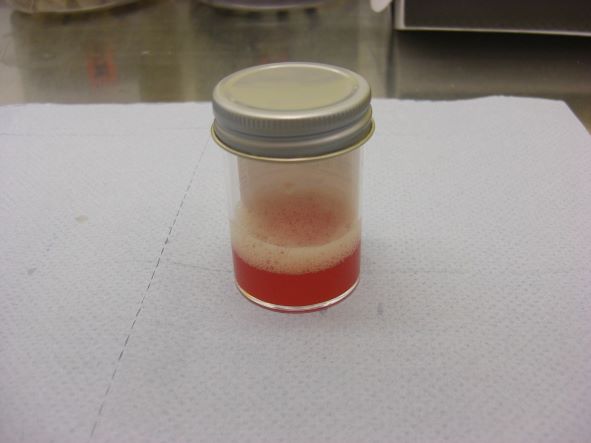
|
- 50 -75 mls fluid should be sent in a clean dry container with screw cap (Note: no formalin or alcohol should be added to the sample as both of these can cause interference with adherence to slide and quality of staining)
- The fluid should be submitted as soon as possible to minimise cell deterioration, so that cell preservation is not compromised
- If there is a delay in delivering the sample to the laboratory, the sample should be kept refrigerated at 40C (Note – the sample should NOT be frozen).
|
| Cyst Fluids |
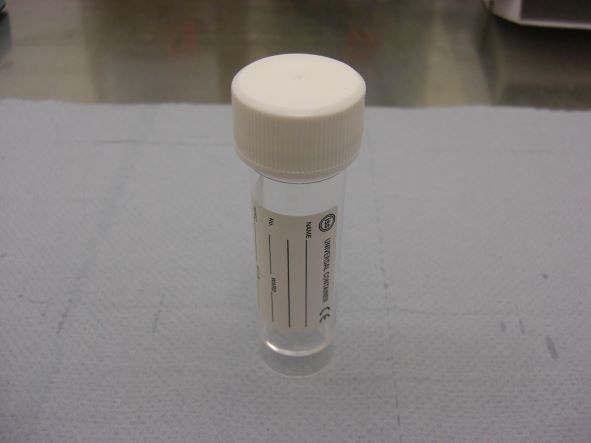 |
- Cyst fluid samples should be put into a clean dry container with screw cap.
- The fluid should be submitted as soon as possible to minimise cell deterioration, so that cell preservation is not compromised
- If there is a delay in delivering the sample to the laboratory, the sample should be kept refrigerated at 40C (Note – the sample should NOT be frozen)
|
| Urinary tract inc voided, catheter, ileal conduit, ureteric and urethral |
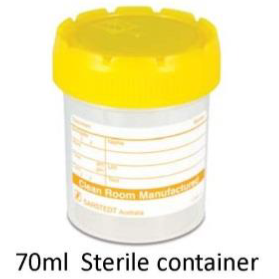
|
- Collect urine in a clean, dry container with a screw cap. A 20ml to 50ml container, preferably with yellow lid (see image) is suitable
- Please do not send urine for cytology in Sarstedt Monovette
- An adequate urine sample is the second voided of the day, preferably mid-morning.
- Please note: The first sample voided in the morning is unsuitable for cytological analysis
- Urine can be collected from catheters as well as washings from the bladder or upper urinary tract. The request form must state the method of collection
- If there is a delay in delivering the sample to the laboratory, the urine sample should be kept in a fridge at 4ºC
- A voided urine received in the laboratory more than 2 days old may be rejected
|
| CSF |
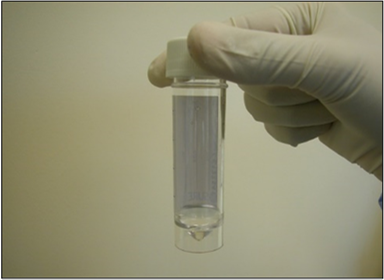 |
- A clean, dry container with screw cap should be used
- CSF samples are liable to degenerate rapidly and as such must be prepared immediately. Please contact the laboratory to inform staff of imminent arrival of a CSF sample, and leave a bleep or contact number
- Latest processing time for samples is 15.30 hrs Mon-Fri. CSF samples must be received at least half an hour before this time
- If out of hours sampling is unavoidable, storing the sample in refrigerator at 4°C may help preserve cells for up to 24 hours.
|
|
Gastro Tract Brush samples including bile duct brushes
|
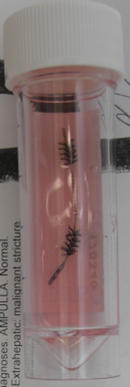 |
- Place brush into clean screw capped container with CytoRich® Red preservative fluid. Ensure brush is fully immersed in preservative
- The time of this fixation should be indicated on the label of the container
- DO NOT USE FORMALIN FIXATIVE
- Please note: When the stock of CytoRich® Red preservative fluid is running low or close to its expiry date, please contact the cytology department on 276 5110/5115 for replacement of stock.
|
| Bronchial Brushings |
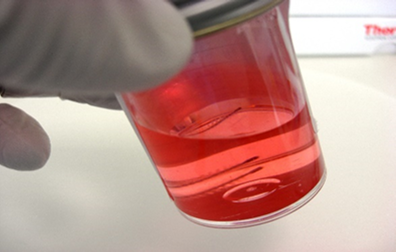 |
- Place brush into clean screw capped container with CytoRich® Red preservative fluid. Ensure brush is fully immersed in preservative
- The time of this fixation should be indicated on the label of the container.
- DO NOT USE FORMALIN FIXATIVE
- Please note: When the stock of CytoRich® Red preservative fluid is running low or close to its expiry date, please contact the cytology department on 276 5110/5115 (Oxford Road) or 0161 291 2156 (Wythenshawe) for replacement of stock.
|
| Bronchial Trap/Wash |
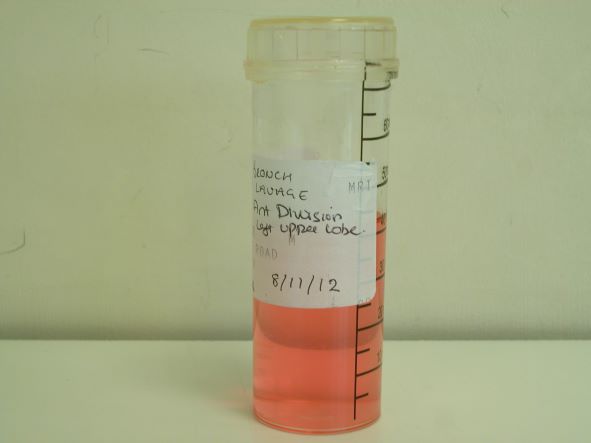 |
- Fresh specimen should be placed in a clean dry container and an equal volume of CytoRich® Red preservative fluid added immediately for fixation
- The time of this fixation should be indicated on the label of the container
- If CytoRich® Red preservative fluid is not available, fresh specimen should be placed in clean dry container. Delay in receipt of unfixed samples can lead to deterioration of specimen
- If differential cell count is required, split the sample and send half unfixed and the other half fixed in CytoRich®.
- Send unfixed samples on ICE and received by the laboratory before 3.30pm
|
| Bronchoalveolar Lavage |
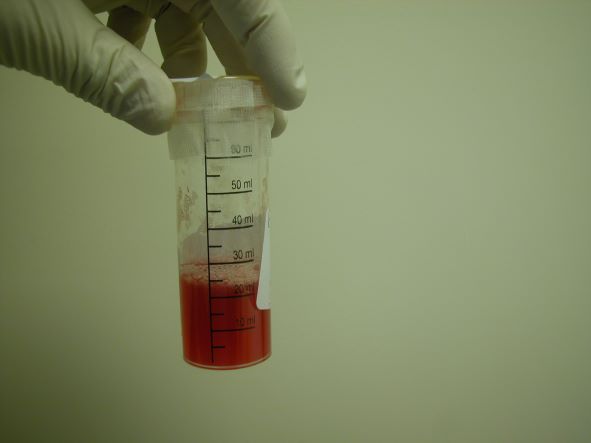 |
- Fresh specimen should be placed in a clean dry container and an equal volume of CytoRich® Red preservative fluid added immediately for fixation
- The time of this fixation should be indicated on the label of the container
- If CytoRich® Red preservative fluid is not available, fresh specimen should be placed in clean dry container. Delay in receipt of unfixed samples can lead to deterioration of specimen
If differential cell count is required, split the sample and send half unfixed and the other half fixed in CytoRich®.
Send unfixed samples on ICE and received by the laboratory before 3.30pm |
| Fine Needle Aspirations |
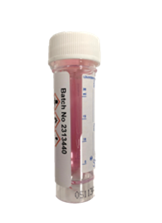  |
· Standard disposable 23-25 gauge needles. A 25 gauge (orange) needle is suitable for most lesions
· Disposable 10 ml plastic syringes
· Clean container with tight lid (preferably universal) containing CytoRich® Red preservative fluid
· Standard microscopic glass slides onto which aspirate is to be spread.
See Sections 7.13, 7.14 and 7.15 for guidance |
| Buccal smears (Wythenshawe site) |
 Slide box Slide box |
- 4 fixed smear slides
- Alcohol spray fixative is available from the laboratory
|
| Tongue smears (Wythenshawe site) |
 Slide box Slide box |
- 1 fixed smear slide
- Alcohol spray fixative is available from the laboratory
|
Please note: When the stock of CytoRich® Red preservative fluid is running low or close to its expiry date, please contact the cytology department on 276 5110/5115 (Oxford Road) or 0161 291 2156 (Wythenshawe) for replacement of stock.
Endobronchial ultrasound guided aspirate specimens (EBUS)
These should be delivered to the department as soon as possible so that preparation of the samples can be undertaken. It is appreciated that reports are wanted on these specimens in a timely fashion for MDT discussion.
Joint fluids
Joint Fluids should be sent to Diagnostic Cytology at Oxford Road site for reporting. The contact details are
Jacquelyn Medlock
Jacquelyn.Medlock@mft.nhs.uk
Cytology Manager
Rosebina Zafar
Rosebina.zafar@mft.nhs.uk
Lead Biomedical Scientist Diagnostic Cytopathology |
Manchester Cytology Centre
Clinical Science Building 2
Manchester Royal Infirmary
Oxford Road
Manchester
M13 9WL |
Tel 0161 276 5119 |
Cervical cytology
Cervical cytology is sent to the Oxford Road site for reporting. The contact details are:
Jacquelyn Medlock
Jacquelyn.Medlock@mft.nhs.uk
Cytology Manager
Adanna Ehirim
Adanna.Ehirim@mft.nhs.uk
Lead BMS Cytopathology |
Manchester Cytology Centre
Clinical Science Building 2
Manchester Royal Infirmary
Oxford Road
Manchester
M13 9WL |
Tel: 0161 276 5119
Fax: 0161 276 5113 |
(Last reviewed February 2025)
 In this section
In this section









